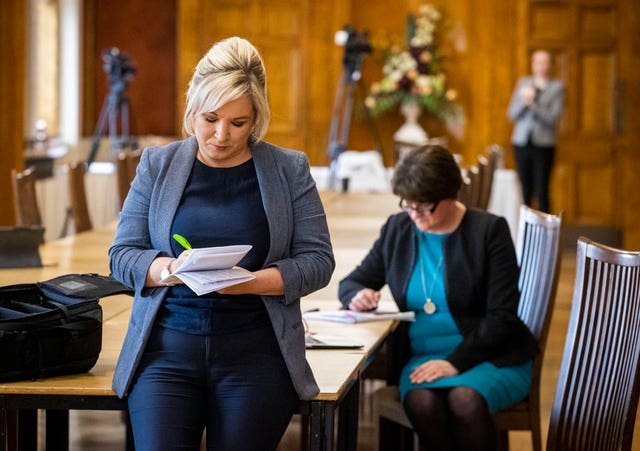
Northern Ireland’s First Minister has warned those who flout social distancing rules over the Easter holidays that they should expect police action.
Arlene Foster joined with Deputy First Minister Michelle O’Neill and all the other ministers in the powersharing executive in a video message stressing the importance of staying at home to limit the spread of Covid-19.
Police have ramped up patrols across the region, targeting beaches, parks and other popular visitor spots, amid fears a combination of good weather and Easter traditions will tempt people to ignore guidelines about staying apart.
Officers have also launched an online portal to allow people to report any breaches they witness.
The number of people with coronavirus who have died in a hospital setting in Northern Ireland rose to 92 on Friday, with 10 further deaths reported.
An important message from your Executive this Easter.#StayAtHome to save lives.@DUPleader | @moneillsf |@RobinSwannMoH | @conormurphysf |@poots2edwin | @naomi_long |@peterweirmla | @NicholaMallon |@gordonlyons1 | @DeclanKearneySF |@DianeDoddsMLA | @DeirdreHargey pic.twitter.com/SkLFWre8WY
— NI Executive (@niexecutive) April 10, 2020
There were 112 new cases of the virus, bringing the total of confirmed positive tests in the region since the outbreak began to 1,589.
Mrs Foster said: “Easter is a special time for families and we understand how difficult this year will be for people.
“But this Easter, even though we can’t be together, we can all still do something special.
“We can help to save lives by staying at home, protecting the most vulnerable, protecting our frontline workers, and protecting our health service.
“We should remember that the message of Easter is all about hope.
“We know and trust that these difficult times will pass.
“By staying home this weekend, and the days to come, we will protect each other and our whole community and prevent heartbreak being brought to someone’s door.”
The First Minister added: “I would remind people that the PSNI will have a strong presence on the ground over the Easter period and beyond, and they will take action against anyone who is flouting the rules on non-essential travel and social distancing.
“So I urge everyone to please stay at home and don’t go out unless you absolutely have to.”
Ms O’Neill said: “We are depending on our healthcare staff and other frontline workers to get us through this time of crisis.

“We all owe them a huge debt of gratitude, and the best way we can show them how much we appreciate what they are doing is by staying at home.
“Easter is normally a time when people come together and spend time with each other.
“But this isn’t a normal Easter, and if we behave as normal then more people will lose their lives.
“I know this isn’t easy, but it won’t last forever.
“So please keep your resolve and don’t go out unless it’s essential.
“It’s in your gift to save lives.”
The Deputy First Minister added: “You must only go out of your home: to shop for basic necessities once a day at the most; to take exercise no more than once a day, alone, or with your household; for medical reasons for yourself, or if providing care or to support a vulnerable person; and to travel to essential work if it absolutely cannot be done from home.”
Their message was echoed by Northern Ireland’s Public Health Agency.
Dr Gerry Waldron, head of health protection at the PHA, said: “Coronavirus is circulating in our community.

“People are dying.
“One of the best things we can do to slow its spread is to follow the advice to stay at home.
“At Easter, people often spend time with their wider families and go for day trips, but this year we are urging people to avoid this and remain at home.
“We appreciate how frustrating this is, particularly if you have been apart from parents, siblings or other family members for several weeks, or are experiencing ‘cabin fever’, but it is essential in the battle against this virus.”
Dr Waldron thanked those who had followed the guidelines to date.
“We are in unprecedented times and the steps we must take are having a major impact on our normal way of life, but the willingness of the community to work with us and take the advice has been very reassuring,” he said.
“The key is to stick with it, this will help protect our health service and save lives.”


Comments: Our rules
We want our comments to be a lively and valuable part of our community - a place where readers can debate and engage with the most important local issues. The ability to comment on our stories is a privilege, not a right, however, and that privilege may be withdrawn if it is abused or misused.
Please report any comments that break our rules.
Read the rules here